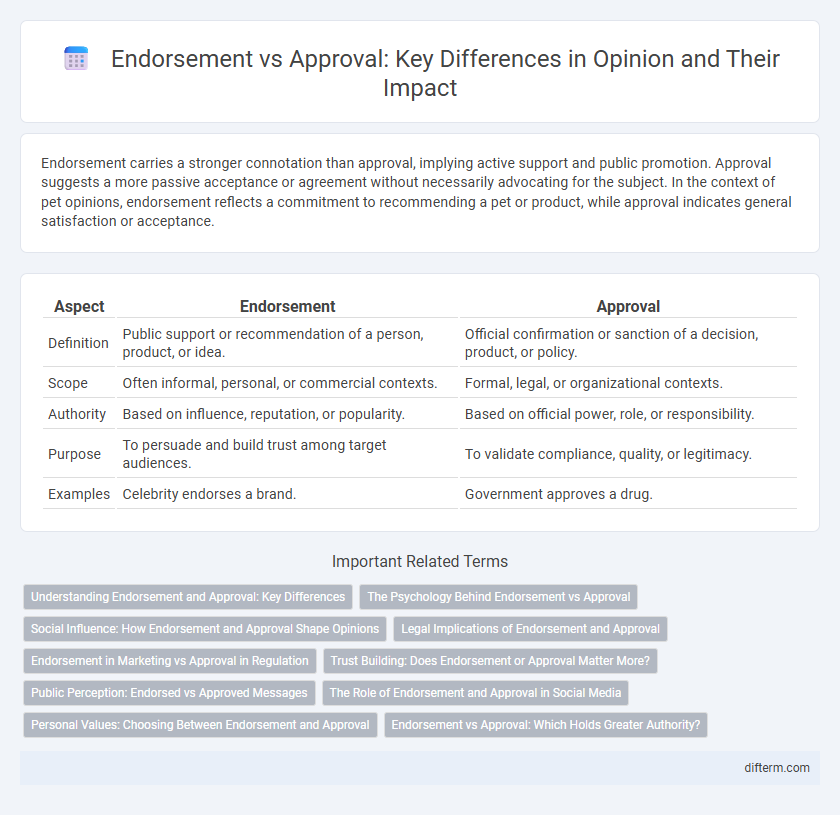Endorsement carries a stronger connotation than approval, implying active support and public promotion. Approval suggests a more passive acceptance or agreement without necessarily advocating for the subject. In the context of pet opinions, endorsement reflects a commitment to recommending a pet or product, while approval indicates general satisfaction or acceptance.
Table of Comparison
| Aspect | Endorsement | Approval |
|---|---|---|
| Definition | Public support or recommendation of a person, product, or idea. | Official confirmation or sanction of a decision, product, or policy. |
| Scope | Often informal, personal, or commercial contexts. | Formal, legal, or organizational contexts. |
| Authority | Based on influence, reputation, or popularity. | Based on official power, role, or responsibility. |
| Purpose | To persuade and build trust among target audiences. | To validate compliance, quality, or legitimacy. |
| Examples | Celebrity endorses a brand. | Government approves a drug. |
Understanding Endorsement and Approval: Key Differences
Endorsement involves publicly supporting a person, product, or idea based on personal belief or experience, often carrying a persuasive influence. Approval, on the other hand, signifies formal consent or agreement, typically from an authoritative body or organization, without necessarily implying personal advocacy. Recognizing these distinctions clarifies communication in marketing, politics, and regulatory contexts by highlighting the levels of support and intent behind statements.
The Psychology Behind Endorsement vs Approval
Endorsement involves a proactive commitment that reflects personal values and identity, while approval often signifies passive agreement without personal investment. Psychological research highlights that endorsement activates deeper cognitive and emotional processing, linking self-concept with the supported idea or product. Understanding this distinction reveals why endorsements can influence behavior more powerfully than mere approvals.
Social Influence: How Endorsement and Approval Shape Opinions
Endorsement, often from celebrities or industry experts, leverages perceived authority to sway public opinion, creating strong social proof that encourages acceptance of ideas or products. Approval, typically coming from peers or community members, fosters trust and relatability, enhancing the likelihood of adoption through shared values and experiences. Both mechanisms crucially shape opinions by activating different social influence pathways: endorsement taps into aspirational identity, while approval strengthens group cohesion.
Legal Implications of Endorsement and Approval
Endorsement carries significant legal implications as it often implies a personal or organizational responsibility for the endorsed product or service, which can lead to liability in cases of misinformation or harm. Approval, while less personal, signifies compliance with established standards or regulations, reducing legal risk but not eliminating it entirely. Understanding these distinctions is crucial for businesses to navigate potential lawsuits and regulatory scrutiny effectively.
Endorsement in Marketing vs Approval in Regulation
Endorsement in marketing leverages influential figures or brands to build trust and drive consumer behavior by associating products with credibility and desirability. Approval in regulation ensures products meet established safety, quality, and legal standards, focusing on compliance rather than persuasion. Emphasizing endorsement enhances brand visibility and emotional appeal, whereas regulatory approval primarily serves as a guarantee of legitimacy and consumer protection.
Trust Building: Does Endorsement or Approval Matter More?
Endorsement plays a crucial role in trust building by leveraging personal credibility and emotional connection, often resonating more deeply with audiences than formal approval. Approval from authoritative sources provides legitimacy and assurance, but it may lack the authentic engagement that endorsements offer. Trust is most effectively established when endorsement complements formal approval, combining emotional influence with institutional validation.
Public Perception: Endorsed vs Approved Messages
Endorsed messages often carry a stronger emotional appeal, influencing public perception by associating a product, idea, or candidate with a trusted figure's credibility and personality. Approved messages, while conveying legitimacy and formal acceptance, tend to be perceived as more authoritative but less personally relatable. The effectiveness of endorsement over approval depends largely on the target audience's values and the context in which the message is delivered.
The Role of Endorsement and Approval in Social Media
Endorsement on social media signifies a personal or public figure's active support, often driving engagement and influencing follower behavior through authentic connections. Approval, however, tends to reflect general consensus or acceptance without the same level of personal investment, impacting brand reputation more broadly. Understanding the nuanced differences between endorsement and approval is essential for strategizing effective social media marketing campaigns.
Personal Values: Choosing Between Endorsement and Approval
Endorsement reflects a stronger alignment with personal values, symbolizing active support and shared beliefs, whereas approval often indicates passive acceptance without deep commitment. Choosing endorsement demands courage to publicly uphold principles, reinforcing identity and integrity. Approval can offer flexibility but may dilute the authenticity of one's stance on important issues.
Endorsement vs Approval: Which Holds Greater Authority?
Endorsement often carries greater authority than approval because it implies a public and explicit support from a trusted figure or organization, enhancing credibility and influence. Approval signifies acceptance but lacks the persuasive weight that an endorsement commands through personal or professional advocacy. The nuanced difference places endorsements as powerful tools in shaping opinions and driving decisions where trust and expertise matter most.
endorsement vs approval Infographic

 difterm.com
difterm.com